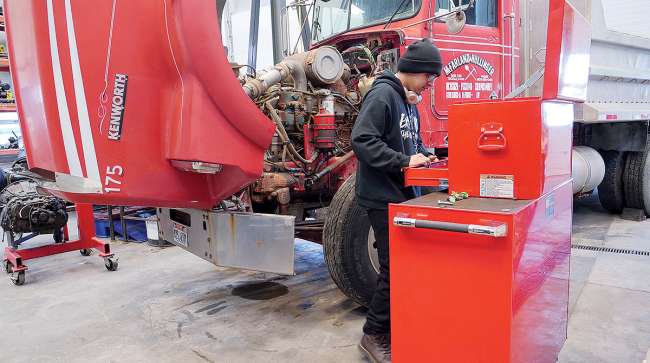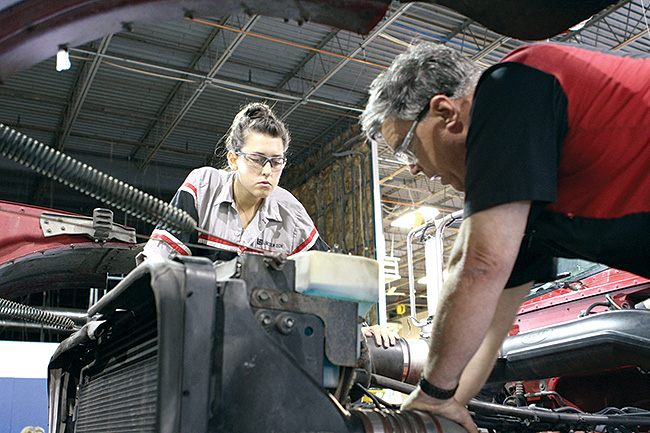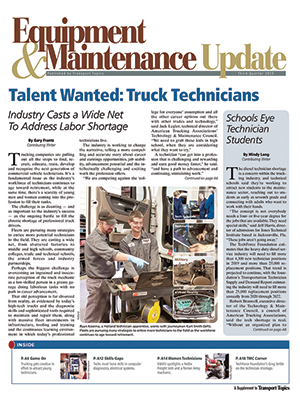Schools Eye Technician Students

[Stay on top of transportation news: Get TTNews in your inbox.]
The diesel technician shortage is a concern within the trucking industry, and technical schools said they’re working to attract new students to the maintenance sector, reaching out to students as early as seventh grade and connecting with adults who want to work with their hands.
“The concept is not everybody needs a four- or five-year degree for the jobs that are available. They need special skills,” said Jeff Harris, director of admissions for Jones Technical Institute based in Jacksonville, Fla. “These jobs aren’t going away.”
The TechForce Foundation estimates that the heavy-duty diesel service industry will need to fill more than 4,300 new technician positions in 2019 and more than 25,000 replacement positions. That trend is projected to continue, with the foundation’s Transportation Technician Supply and Demand Report estimating the industry will need to fill more than 25,000 replacement positions annually from 2020 through 2022.
Robert Braswell, executive director of the Technology & Maintenance Council, a council of American Trucking Associations, said the tech shortage is real. “Without an organized plan to compete with other industries trying to solve their own labor shortages drawing from the same pool of talent, we risk not being able to meet expectations customers have for today and tomorrow’s transportation providers.”
The TechForce Foundation’s report said the number of diesel post-secondary completions have been increasing since 2012.
“The amount of people retiring over the next decade will provide a good path for advancement for those that get into the industry now,” said Scott Shaw, CEO of Lincoln Technical Institute.

Only about 20% of Lincoln Tech's students attend right out of high school. (Lincoln Tech)
Harris said Jones Technical Institute has seen a steady increase in enrollment over the past five years. “It is not a boom, although we’re going to be 20% up this June over the last June,” he said.
Tooele Technical College, based in Tooele, Utah, has seen a 30% increase in enrollment across its CDL and tech programs. Kim Rice, job placement and recruitment specialist for Tooele Tech, credits the growth, in part, to how well the school works with the local county school district.
Through the Utah Diesel Technician Pathways program, Tooele County School District high school students can attend Tooele Tech free and earn school credit.
“They can start as soon as they graduate from the 10th grade,” Rice said, adding that students can attend during their summer breaks. “We encourage them to come as much as they possibly can.”
To help make the program a success, Tooele Tech adjusted its schedule to match the high school’s bell schedule, and busing is provided. Tooele Tech holds informational sessions for parents and students to teach them about the program.
“We have found that educating the parents is a key part of filling this pipeline,” Rice said.
Western Technical College in El Paso, Texas, also has partnered with local high schools, and students can take courses in automotive and diesel. “They bus the students over to the school, they utilize our facilities, our equipment and our instructors,” said Lynda Cervantes, director of marketing for the school.
Rosedale Technical College engages with high schools, attending career days and serving on advisory boards, said Debbie Bier, vice president of college development and communications for the school.
“You have to have a rapport with the administrators, the teachers and the counselors and stay connected that way. They are the ones that guide and direct students,” she said.
Some schools are engaging with students as early as seventh grade. Rice said Tooele Tech visits the local junior highs and has created a diesel technician summer camp for seventh, eighth and ninth graders. This summer, all three sessions sold out.
Western Technical College participates in career fairs in the seventh and eighth grades and focuses on what diesel mechanics do and what they work on, Cervantes said.
Over the years, there has been a strong push for students to attend traditional four-year universities, which has hurt trades.
“There is a huge gap of people not knowing the true need or the great career opportunities that some of these dealerships offer to their employees,” Cervantes said.
Kids are increasingly detached from working with their hands, Shaw said.
“Frankly, we’re now having shortages because we always assumed people would go into these professions, but the reality is they’re not even exposed to them, or there is a negative stigma attached to them,” he said.
Schools are also focusing on adults interested in a second career and those transitioning out of the military, with Shaw estimating that only about 20% of Lincoln Tech’s students come right out of high school. He said the average age of students is around 25. “Some people are looking to find a better paying or more secure job than they have today,” Shaw said, adding that the veteran market is robust.
About 20% of the adults entering for-profit Lincoln Tech’s programs are veterans. Western Technical College also serves a high population of veterans who can get their associate degrees while they’re transitioning out, Cervantes said.
The types and lengths of diesel technician programs can vary.
Lincoln Tech offers a certificate as well as a degree program.
“The diesel part of the program is the same for both. If you get your degree, you also take math, writing, history and general ed,” Shaw said, adding that some parents want their kids to earn a degree. “Most employers don’t require a degree to get started.”
Rosedale Technical College offers a 16-month associate degree program in diesel technology and an 18-month diesel technician program in the evenings. The technician program curriculum focuses on preventive maintenance, brakes, hydraulics, engines and diagnostics, but does not require general education classes, such as applied math, physics and computer concepts. “To receive an associate degree, you have to have your general education classes as well,” Bier said.
Harris said Jones Technical Institute created a program that enables students to continue working while going to school, which can be attractive to those already in the workforce. It is 2.5 days a week and 21 months long. The school also has a night program.
“It allows them to totally not disrupt their life,” he said, adding that the school is creating a 12-month, five-day-a-week offering that can get students out quicker.
High school students who were able to begin a program have a head start on tech school graduation.
“If high school students attend during their school year, then attend the summer after they graduate, they could have their diesel certificate before September,” Rice said.
Harris said he promotes the economic aspects of becoming a technician and discusses the skills gap when recruiting new students.
“These are the areas where wages will rise the fastest because they have to pay a premium and compete for talent,” he said.
The Bureau of Labor Statistics reported that the median annual wage for diesel service technicians and mechanics was $47,350 in May 2018.
Shaw estimates that new graduates can earn between $12 and $19 an hour.
“That can scale up from there based on work ethic and skill set. If you’re at an employer for seven years and a good diesel tech, you’re making close to six figures,” he said.

- Talent Wanted: Truck Technicians
- FutureTech Champ Advances Her Career
- Former Army Mechanic Is Now a Truck Tech
- Electric Trucks Will Demand New Expertise
- The Technician's Vital Role in Trucking
- Understanding the Numbers Behind the Shortage
- Trucking Gets Creative in Attracting Young Technicians
- Clear Career Paths Needed for Technicians
- Closing the Skills Gap: Techs Must Master Diagnostics, Electrical
Sean Farris, director of recruiting and institutional effectiveness for Tooele Tech, said an added advantage of tech schools is that students won’t go into the traditional debt associated with a college degree and many employers are willing to offer tuition reimbursement.
Tooele Tech students who graduate from the heavy-duty diesel program receive a Tooele Tech certificate of proficiency. Tuition can be paid monthly and averages just more than $3,000 to complete the program.
Lincoln Tech’s program is 13 months and costs about $30,000 for an associate degree.
One thing that appeals to students is the enthusiasm of their potential employers.
“Companies are fighting for these technicians,” Farris said.
Bier said students have no problem getting jobs when they finish school. “We have over 1,000 employers that engage with us at different times of the year to try to recruit our students,” Bier said.
Even with all of the advantages of entering the tech industry, schools said recruiting students isn’t always easy. Bier noted many students are going straight to the workforce right out of high school, particularly given the strong economy and high-paying jobs many students can find in some industries, such as the oil and gas field. What’s more, some trucking companies are willing to provide in-house technical training to employees.
Rice said some people might view being a diesel technician as a dirty, low-tech or a dead-end job, which isn’t true. “It is physical, and you’re going to use your hands, but you’re not a laborer. You’re a technician,” she said.
Today’s techs increasingly work with laptops and white coats, Harris said.
“They fix sensors versus tear apart an engine,” he said, adding that the increased technology used in automotive and diesel vehicles may be appealing to future techs.



